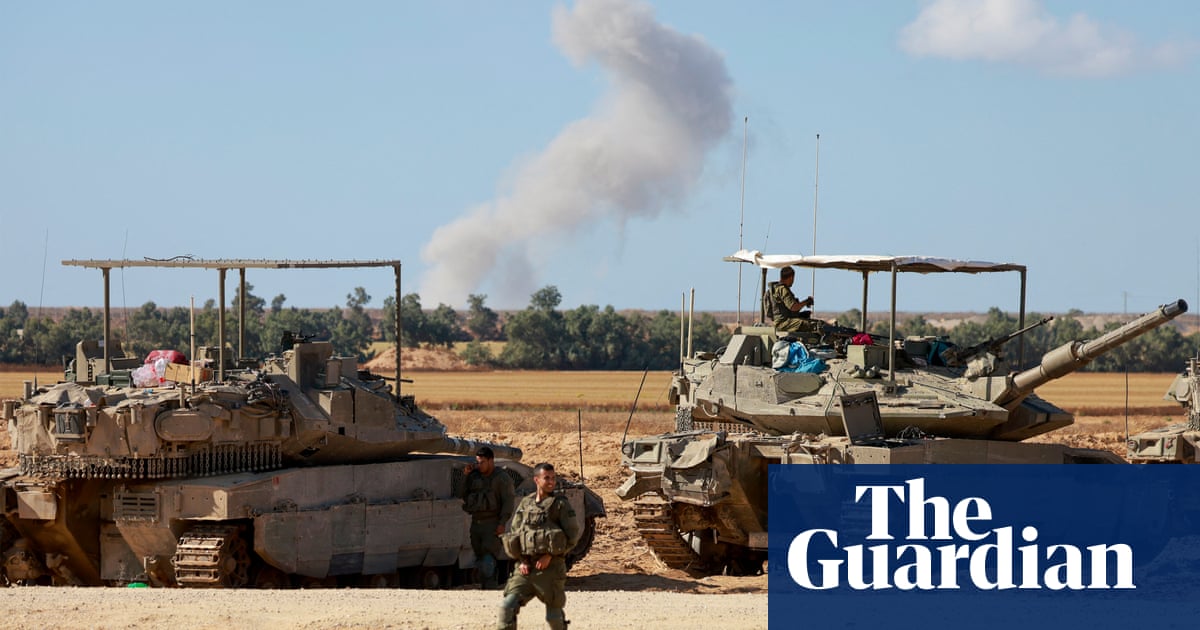Israeli military forces have taken control of the Palestinian side of the Rafah crossing between Gaza and Egypt, a key strategic objective and the sole gateway between Egypt and Gaza for humanitarian aid, Israeli military officials have confirmed.
“At the moment we have operational control of the Gazan side of the Rafah crossing and we have special forces scanning the crossing … That is what is happening in the upcoming hours. The operation is not over … I can’t give a timeline,” a military official said on Tuesday morning.
The spokesperson for the Gaza border authority on Tuesday confirmed the presence of Israeli tanks at the Rafah crossing. Aid officials in the territory said the flow of aid through the crossing had been halted.
The Israeli operation is taking place ahead of a fresh round of indirect negotiations on a ceasefire in Cairo after an announcement by Hamas leaders on Monday night that they would accept a recent proposal for a deal. Israeli officials said they would send a delegation for further talks although the terms did not meet its core demands.
“Israel is receiving Hamas response … an Israeli delegation will soon be in Cairo,” the military official said.
The promise of continued talks left a glimmer of hope alive for an agreement that could bring at least a pause to the seven-month-old war that has devastated Gaza.
The Israeli military said late on Monday it was conducting targeted strikes against Hamas in Rafah. The city’s Kuwaiti hospital said on Tuesday that 11 people had been killed and dozens of others injured in the strikes.
After vowing for weeks to push into the southern border city, Israel on Monday called for Palestinians in several neighbourhoods in eastern Rafah to leave for an “expanded humanitarian area” to the west and north of the city ahead of a ground incursion.
The military official said the target of the operation in Rafah was “terrorist infrastructure”, after rockets were launched at Israeli troops at the Kerem Shalom crossing earlier this week.
“We were able to operate in this manner and quickly because of the vast majority of people evacuating and moving and we were able to operate in a very specific area. We are only talking about the Gaza side of the crossing,” the official said.
The Rafah crossing is a vital aid lifeline and particularly sensitive for Egypt, which is anxious to avoid a mass migration of Palestinians into its Sinai desert in the event of a major offensive into the city, which lies just to its west.
A permanent presence at the crossing would give Israel the ability to control all traffic, including aid shipments, and could act as a launchpad for further operations against the cross-border tunnels which, Israeli officials have said, allow Hamas to obtain vital supplies.
The more than 1 million Palestinians taking refuge in Rafah were thrown into confusion by events on Monday, with Israel’s evacuation order triggering an exodus of thousands of people.
Photograph: Hatem Khaled/Reuters
In a private meeting on Monday, Jordan’s King Abdullah told the US president, Joe Biden, that an Israeli offensive in Rafah would lead to a “new massacre” of Palestinian civilians and urged the international community to take urgent action.
In a phone call on Monday, Biden pressed Benjamin Netanyahu, Israel’s prime minister, not to go ahead with a large-scale offensive. Biden has been vocal in his demand that Israel not undertake a ground offensive in Rafah without a credible plan to protect Palestinian civilians.
Matthew Miller, a US state department spokesperson, said the US had not seen such a plan, adding that Washington could not support an operation in Rafah as it is currently envisioned.
Miller said US officials were reviewing the Hamas response to the ceasefire proposal “and discussing it with our partners in the region”.
It was not immediately clear if the proposal Hamas agreed to was substantially different from one that Antony Blinken, the US secretary of state, pressed the group to accept last week and which he said included significant Israeli concessions.
Talks in Cairo had appeared to stall at the weekend over Hamas’s insistence that Israel should commit to making the ceasefire permanent at the outset of the agreement, rather than to negotiate its duration after the truce had taken hold.
Reports in local media on Tuesday suggested that the deal Hamas agreed to does not include an immediate demand for a permanent end to hostilities, but also changes other elements of the Egyptian deal proposal, such as the requirement that it free 33 hostages in the first phase. It also reportedly removes Israel’s right of veto on which Palestinian detainees are released in exchange.
The proposal is complex, involving three consecutive phases, with different ratios for exchanges of Palestinian prisoners in Israeli jails for hostages and a series of staged withdrawals of Israeli forces from zones of Gaza. Further negotiations could take many days or even weeks, analysts said.
Netanyahu’s grip on power might slip if he loses support of far-right coalition allies who oppose any concessions to Hamas, but there is also pressure to free the remaining hostages.
On Monday night, hundreds of Israelis rallied around the country calling for the government to agree to the terms of the deal that Hamas had accepted.
About 1,000 protesters gathered near the defence headquarters in Tel Aviv, while in Jerusalem, about 100 protesters marched toward Netanyahu’s residence with a banner reading, “The blood is on your hands”.







